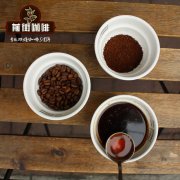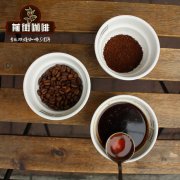East Timor Coffee East Timor- East Timor Coffee Dulis plus production area Muqiu Family Garden Tim

Professional coffee knowledge exchange more coffee bean information please follow the coffee workshop (Wechat official account cafe_style)
East Timor Coffee East Timor- East Timor Coffee Dulis plus production area Muqiu family farm Tim how is the flavor and taste?
Most of the coffee in East Timor is grown in small farms, with small quantity but good quality, high purity and spice flavor, suitable for a variety of different degrees of baking, and can be compared with high-quality Java varieties in appearance and taste. The original Arabica coffee beans produced in Indonesia and East Timor are large, but the size is not symmetrical, the aroma and bitterness are in the middle, and the fruit is light and sour. Licorice, walnut biscuits, rice fragrance, grapefruit acidity and taste, chocolate tail.
Coffee in East Timor is of great benefit to the local people, as sales benefit mostly from producers' cooperatives made up of organic coffee farmers rather than exporters. Coffee here is famous for its rich and deep flavor, usually with leather and tobacco flavor. East Timor, located between Indonesia and Australia, was a former Portuguese colony. After Portugal left in the early 1970s, Indonesia invaded and bloodily persecuted the islanders, leading to the East Timorese people's pursuit of independence. After years of struggle, they finally elected their own president independently in 2002.
East Timor is supposed to be the world's largest producer of organic coffee because the deteriorating security of the independence movement over the past 30 years has prevented chemical fertilizers and pesticides from being transported to remote coffee fields. Coffee farmers rarely spray pesticides and grow them all on natural organic fertilizers.
East Timor (East Timor), a former Portuguese colony, is located on a small island between Indonesia and Australia. In 1999, the World Association of Coffee producing countries (ACPC) announced that East Timor is the largest producer of live coffee in the world.
◎ production area East Timor
◎ raw bean treatment method
◎ flavor characteristics mentioned that Indonesian coffee may be familiar with Mantelin, Java or Sulawesi, in fact, East Timor also grows Arabica beans with unique flavor, this coffee bean aroma and bitterness are in the middle, no acid, full palatability and full of stamina top organic coffee.
Coffee beans are a major export of East Timor. Kara Scalaro, a former agricultural director, points out that East Timor has an annual budget of about US $100 million, but coffee beans earn enough profits to support East Timor's budget of 50%, which is the cornerstone of East Timor's future economic autonomy. How to further increase coffee production capacity and expand the international market has become the key to whether East Timor can take charge of the country as soon as possible.
Timor-Leste is most famous for its organic coffee, which is interestingly related to the deteriorating law and order of the independence movement, as chemical fertilizers and pesticides cannot be transported to remote coffee fields, coffee farmers rarely spray pesticides and grow them entirely from natural organic fertilizers.
Statistics also show that East Timor's Arabica organic coffee exports are 40% higher than pesticide-sprayed Arabica beans. East Timorese coffee is sun-treated with the same consistency as Mantlin, but it has a special fishy smell or bitumen smell, which is different from Mantlin's fishy smell, and some foodies like this alternative flavor. East Timor coffee and Java beans are soft beans, the first explosion and second explosion come faster when baking, it is worth noting that do not overbake it. Some land developers in East Timor foresee the future of coffee and are ready to invest. Linma is one of them. "I intend to give up the development of the beach and put the money into the coffee planting industry, because this is the future fate of East Timor and is worth betting on," he said. "with the expansion of coffee production capacity in East Timor, it will be easier for the world to drink good coffee with oil flavor.
Alpine East Timor organic coffee beans, cultivated organically and belonging to Arabica, insist on not using chemical fertilizers or spraying pesticides and herbicides. The coffee grown in this way is absolutely pollution-free high-quality coffee. For coffee lovers, Alpine East Timor organic coffee is a natural food without chemical fertilizers; it absorbs nutrients contained in nature itself, and the output of this product is not much. Gluttons who like top coffee should not miss it. This kind of coffee bean is a top organic coffee that is not sour, bitter, astringent, mellow, full-bodied and full of stamina.
Coffee Arabica means the best quality coffee in the world, and the ideal planting sites are located in the circular zone of the Tropic of Cancer (between 25 degrees north and south) and mountainous areas or subtropics that are not easy to frost, with typical items such as Costa Rica in Central America. Guatemala, Colombia in South America. Brazil, Kenya in Africa. Ethiopia, Sumatra, Indonesia. Mantelin, etc., whose output accounts for about 70% of the world's total output, while the Arabica Arabica referred to here is the original Arabica species produced in Indonesia and the island of East Timor. The granules of this coffee bean are large, but the size is not symmetrical, and the aroma and bitterness are in the middle, without acidity, and are mostly used in the blending of comprehensive coffee.
Origin: East Timor
Grade or variety: East Timor
Palate: not all acidic, sweet and bitter taste in the middle.
Aroma: the aroma is in the middle.
Vision: although the particles are large, but the size is not consistent, the color of raw and cooked beans has a difference.
Producing area: Durika area
Producer: Muqiu Family Farm 1800m
Treatment: washing
Flavor: licorice, walnut biscuits, rice flavor
Qianjie coffee is recommended for brewing:
Filter cup: KONO filter cup
Water temperature: 88 degrees
Degree of grinding: small Fuji degree of grinding 4
Cooking method: the ratio of water to flour is 1:14, 17g powder, 25g water for the first time, steaming for 30s, and 238g water for the second time. The extraction time is about 2:30 seconds.
Analysis: there are not many ribs at the bottom of the Kono cup, and the filter paper clings to the filter cup to achieve the purpose of limiting air flow, which can make water and coffee powder have longer contact soaking time in the filter cup and ensure the extraction time and extraction rate of rough grinding. In this way, the coffee powder can be fully extracted, enhance the mellow taste and make the taste more concentrated.
Important Notice :
前街咖啡 FrontStreet Coffee has moved to new addredd:
FrontStreet Coffee Address: 315,Donghua East Road,GuangZhou
Tel:020 38364473
- Prev

Coffee flavor and taste of washed organic beans in Maubesse, East Timor? East Timor coffee species
Professional coffee knowledge exchange more coffee bean information please follow the coffee workshop (Wechat official account cafe_style) East Timor Maubesse production area of washed organic beans coffee flavor and taste? What kinds of coffee do you have in East Timor? East Timor, located between Indonesia and Australia, was formerly a colony of Portugal; Indonesia invaded after Portugal left in the early 1970s
- Next

East Timor Coffee Flavor and Taste of Small Farmers in Lakau Village, Amerah Mountains? How to use Kono
Professional coffee knowledge exchange More coffee bean information Please pay attention to coffee workshop (Weixin Official Accounts cafe_style) East Timor coffee Timer Aimeira mountain Lakao village flavor and taste? How to cook in kono cup? East Timor is a small island between Indonesia and Australia. After 450 years of colonization and rule by Portugal and 25 years of Indonesian rule, the local people generally do not
Related
- Detailed explanation of Jadeite planting Land in Panamanian Jadeite Manor introduction to the grading system of Jadeite competitive bidding, Red bid, Green bid and Rose Summer
- Story of Coffee planting in Brenka region of Costa Rica Stonehenge Manor anaerobic heavy honey treatment of flavor mouth
- What's on the barrel of Blue Mountain Coffee beans?
- Can American coffee also pull flowers? How to use hot American style to pull out a good-looking pattern?
- Can you make a cold extract with coffee beans? What is the right proportion for cold-extracted coffee formula?
- Indonesian PWN Gold Mandrine Coffee Origin Features Flavor How to Chong? Mandolin coffee is American.
- A brief introduction to the flavor characteristics of Brazilian yellow bourbon coffee beans
- What is the effect of different water quality on the flavor of cold-extracted coffee? What kind of water is best for brewing coffee?
- Why do you think of Rose Summer whenever you mention Panamanian coffee?
- Introduction to the characteristics of authentic blue mountain coffee bean producing areas? What is the CIB Coffee Authority in Jamaica?

